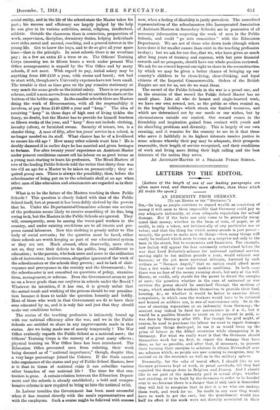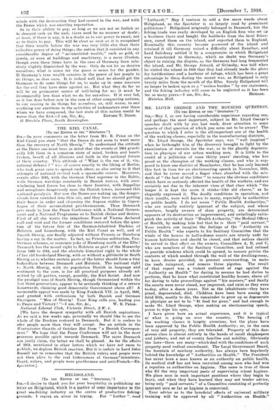LETTERS TO THE :EDITOR
. [Letters of. the length of one of our leading paragraphs are often more read, and therefore more effective, than those which fill treble the space.] AN INDEMNITY FROM GERMANY.
[To ma EDITOR OF THE "SPECTATOR."' SIR.—So long as people continue to regard wealth as consisting of money it will seem to them impossible that Germany could pay us any adequate indemnity, or even adequate reparation for actual damage. But if the facts can only come to be generally recog- nized that money, whether in the form of coin, of paper, or of credit, is only a token, not intrinsically of any particular use er value; and that the thing for which money stands is just power— namely, the power to make men do things—then many things will easily be realized which seem to come as a surprise not only to the man in the street, but to economists and financiers. For example, how foolish 'will appear the fear commonly entertained before the war that Lord Roberts's scheme for universal national service, costing eight to ten million pounds a year, would exhaust our finances; or the yet more universal delusion, fostered by such writers as " Norman Angell," that no nation could afford more than a few weeks of war under modern conditions. In both cases there was no fear of the money running short, but only of the will. Money, or credit, only stands for the power to direct the energies of men; the question whether in the case of universal or war services the power should be exercised through the medium of wages, which enable the workers themselves to provide their food, housing, &c., or whether it would be better to exercise direct compulsion, in which case the workers would have to be rationed and housed as soldiers are, is one of convenience only. So in the case of exacting reparation or an indemnity from Germany; the amount may indeed be fixed for convenience in s. d., but it would be a positive blunder to insist on its payment in gold, as was done by Germany after 1870. For though the gold might, of course, be used to purchase the labour we want to repair damages and replace things destroyed, to use it so would force up the prise of labour in the Allied countries while cheapening it in Germany. For what we really want is that the Germans should themselves work for us, first, to repair the damage they have done, as far as possible, and after that, if necessary, to prevent their turning their energies to schemes to obtain Herrschaft over us; schemes which, as people are now coming to recognize, may be carried on in the economic as well as in the military sphere.
Personally, for the sake of moral effect, I should like to see German prisoners kept at work, in penal servitude, till they had repaired the damage done in Belgium and France. And I should like to see part of the indemnity paid in actual ships, whether now existing, or to be built by the Germans in order to be handed over to us; because there is a danger that if only cash is demanded they will fail to recognize that in fact it is we who are making them work, and work for us. No doubt in any case they would have to work to get the cash, but the punishment would lose half its effect if the work were not directly associated in their
minds with the destruction they had caused in the war, and with the Power which was exacting reparation. -.
As to their ability to pay, so long as we are not so foolish as to demand cash on the nail, there need be no manner of doubt; at least, if there is any, it is a doubt as to our power to exact, not as to theirs to pay. This will be clear as soon as it is recognized that their wealth before the war was very little else than their collective power of doing things; the notion that it consisted in any considerable degree of -" accumulated wealth," such as gold, cr jewels, or even of buildings and machinery, is a mere illusion, though even these items have in the case of Germany been rela- tively slightly diminished by the war. Only do not let us deceive ourselves; what is sauce for the goose is sauce for the gander. If Germany's true wealth consists in the power of her people to do things, so does ours. It is indeed well that we should get the Germans to do some things for us, to make up in some measure for the evil they have done against us. But what they do for us will be no permanent source of well-being for us; it must be incomparably less than what we do for ourselves. if it ever led, as it has done before now in the case of other conquering nations, to our ceasing to do things for ourselves, or, still worse, to our confining our exertions to the activities of taskmasters over those whom we have conquered, the last state of this nation would be











































 Previous page
Previous page